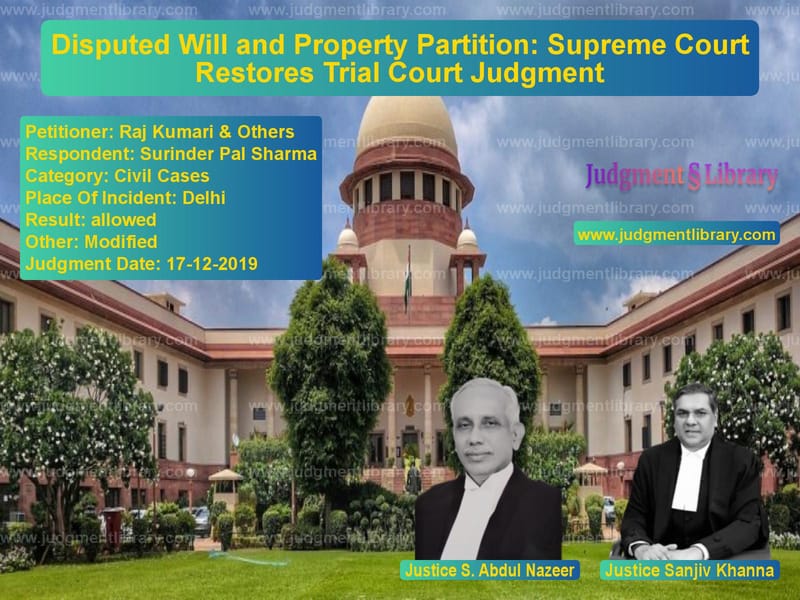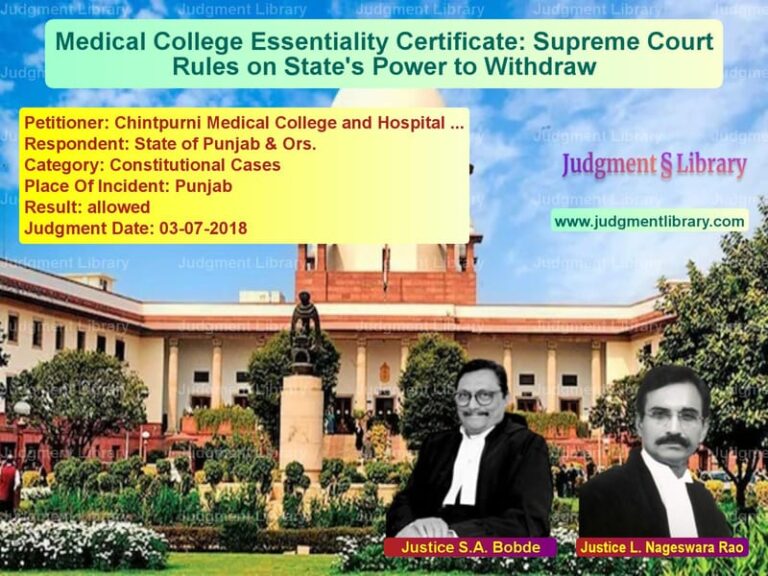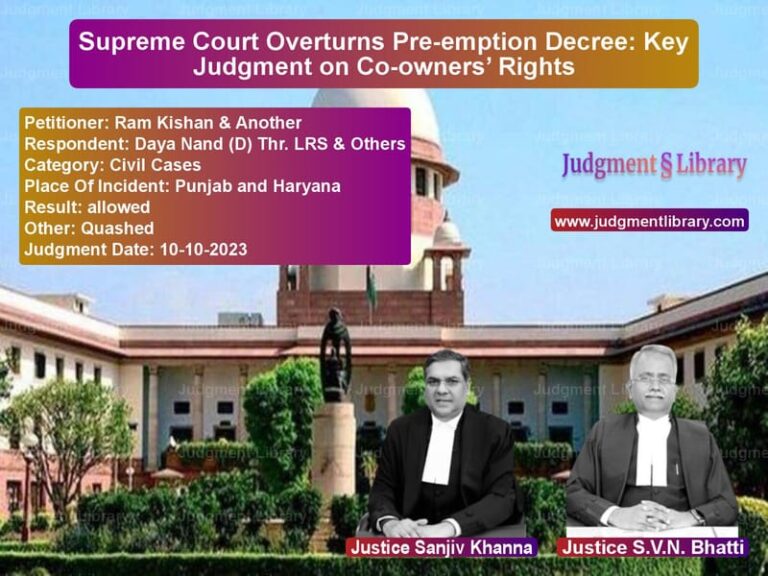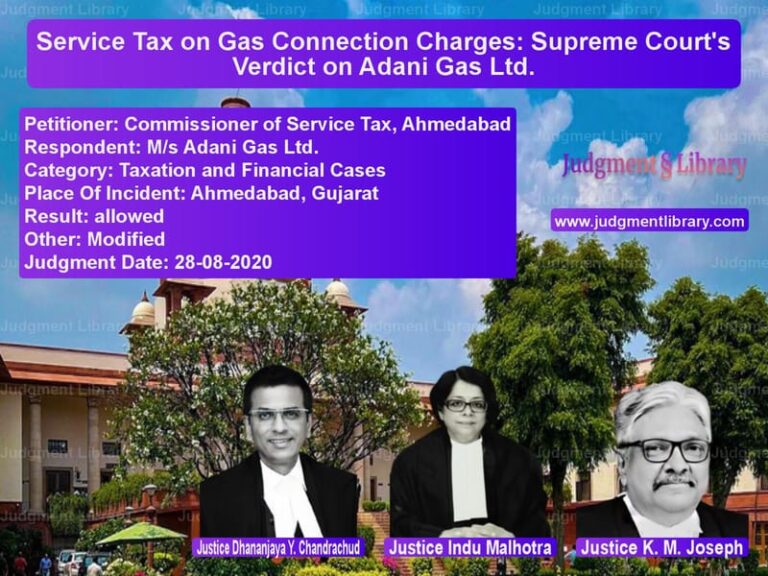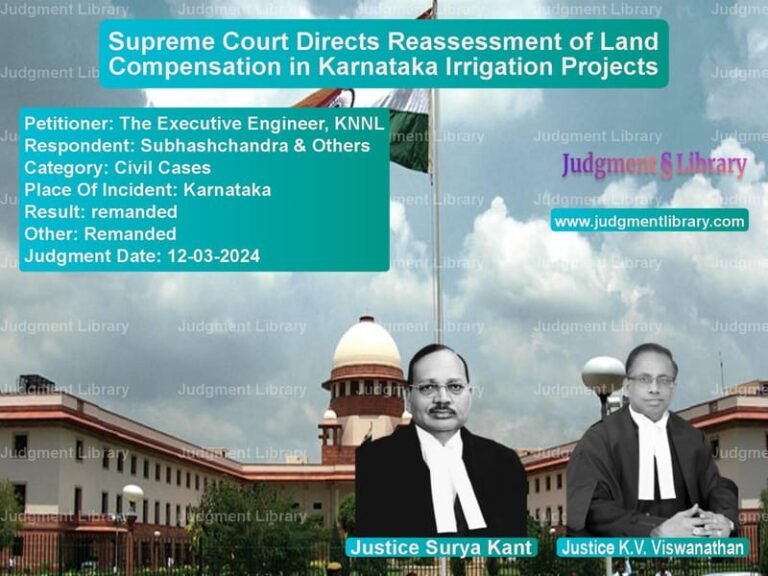Disputed Will and Property Partition: Supreme Court Restores Trial Court Judgment
The case of Raj Kumari & Others v. Surinder Pal Sharma is an important ruling in property law, particularly in disputes related to wills and succession. The Supreme Court of India, in its judgment dated December 17, 2019, restored the trial court’s decision granting a partition of a disputed tenement in favor of all legal heirs and set aside the High Court’s ruling that had upheld a contested will.
The dispute centered around a residential property allotted to Suhagwanti Devi, the mother of the litigants, under a redevelopment scheme. The appellants challenged a will allegedly executed by Suhagwanti in favor of one of her sons, Surinder Pal Sharma, claiming that it was not legally valid and that the property should be divided equally among all heirs.
Background of the Case
The case has its roots in the post-partition resettlement of displaced persons in Delhi. The family patriarch, Harbans Lal, had migrated to Delhi following partition and applied for a two-room accommodation under a government scheme. After his death, the property was allotted to his wife, Suhagwanti, in 1972.
Upon Suhagwanti’s death in 1999, Raj Kumari, one of her daughters, filed a suit for partition of the tenement, seeking equal ownership along with the other legal heirs. The suit was contested by Surinder Pal Sharma, who produced a registered will dated January 2, 1992, allegedly executed by Suhagwanti, bequeathing the property solely to him.
Petitioners’ Arguments
Raj Kumari and the other appellants argued that:
- The will was not validly executed as per legal requirements.
- Surinder Pal Sharma had failed to examine any attesting witness, violating Section 68 of the Evidence Act.
- The will did not comply with Section 63(c) of the Indian Succession Act, which mandates that a will must be attested by two witnesses.
- The alleged will was never disclosed until the property dispute arose.
- The testator, an illiterate woman, may not have understood the nature of the document.
Respondent’s Arguments
Surinder Pal Sharma, defending the validity of the will, contended that:
- The will was registered, and a presumption of validity should apply under Section 114 of the Evidence Act.
- The testator’s husband had signed as an attesting witness.
- The will had been properly drafted and registered in the presence of a Sub-Registrar.
- There was no coercion or fraud in obtaining the will.
Trial Court’s Judgment
The trial court ruled in favor of the appellants, rejecting the will on the grounds that:
- It did not meet the legal requirements of attestation.
- No attesting witness had been examined to prove its execution.
- The claim of exclusive ownership was inconsistent with previous actions by Surinder Pal Sharma.
High Court’s Reversal
The Delhi High Court overturned the trial court’s decision, holding that:
- The will had been attested by two witnesses.
- Efforts had been made to summon an attesting witness who did not appear.
- The will’s registration created a presumption of authenticity.
Supreme Court’s Analysis
The Supreme Court disagreed with the High Court’s findings and reaffirmed the importance of strict compliance with legal requirements for proving wills. It observed:
“Recourse to Section 71 of the Evidence Act is impermissible without examination of an attesting witness who was available.”
The Court held that:
- Merely registering a will does not exempt the propounder from proving due execution.
- One of the attesting witnesses, Ramesh Kumar, had not been examined.
- Serious doubts were raised about the will’s authenticity given the circumstances of its execution.
Key Legal Precedents Cited
The Court relied on several precedents to support its ruling:
- Janki Narayan Bhoir v. Narayan Namdeo Kadam – Holding that the requirement to call an attesting witness cannot be dispensed with.
- Benga Behera v. Braja Kishore Nanda – Stating that a Sub-Registrar’s role in registration does not make him an attesting witness.
- Jagdish Chand Sharma v. Narain Singh Saini – Emphasizing that attestation requires intent to witness the execution of the will.
Final Judgment
The Supreme Court allowed the appeal and restored the trial court’s judgment, ruling that:
“Execution of the will has not been proved by ‘other evidence’ in terms of Section 71 of the Evidence Act.”
The Court ordered that the tenement be partitioned equally among all heirs.
Impact of the Judgment
This ruling has important implications:
- It reinforces the strict legal requirements for proving wills.
- It prevents fraudulent claims of exclusive ownership based on unverified documents.
- It upholds the rights of all legal heirs in succession disputes.
Conclusion
The Supreme Court’s ruling in Raj Kumari & Others v. Surinder Pal Sharma affirms that succession disputes must be resolved based on clear legal principles. It ensures that wills are executed and attested properly and that no legal heir is unfairly deprived of their rightful share in ancestral property.
Petitioner Name: Raj Kumari & Others.Respondent Name: Surinder Pal Sharma.Judgment By: Justice S. Abdul Nazeer, Justice Sanjiv Khanna.Place Of Incident: Delhi.Judgment Date: 17-12-2019.
Don’t miss out on the full details! Download the complete judgment in PDF format below and gain valuable insights instantly!
Download Judgment: Raj Kumari & Others vs Surinder Pal Sharma Supreme Court of India Judgment Dated 17-12-2019.pdf
Direct Downlaod Judgment: Direct downlaod this Judgment
See all petitions in Property Disputes
See all petitions in Succession and Wills
See all petitions in Judgment by S. Abdul Nazeer
See all petitions in Judgment by Sanjiv Khanna
See all petitions in allowed
See all petitions in Modified
See all petitions in supreme court of India judgments December 2019
See all petitions in 2019 judgments
See all posts in Civil Cases Category
See all allowed petitions in Civil Cases Category
See all Dismissed petitions in Civil Cases Category
See all partially allowed petitions in Civil Cases Category

